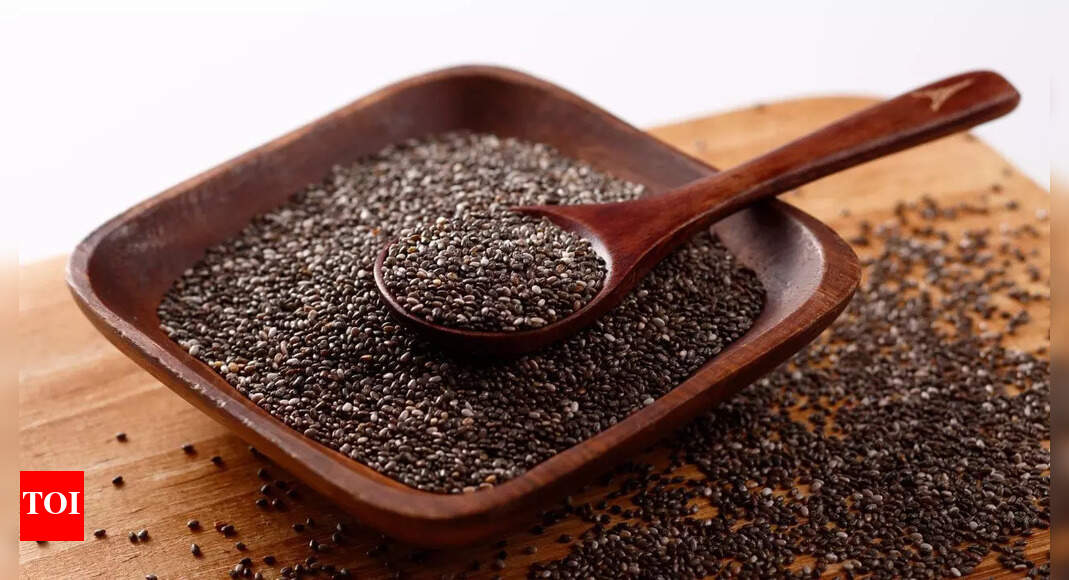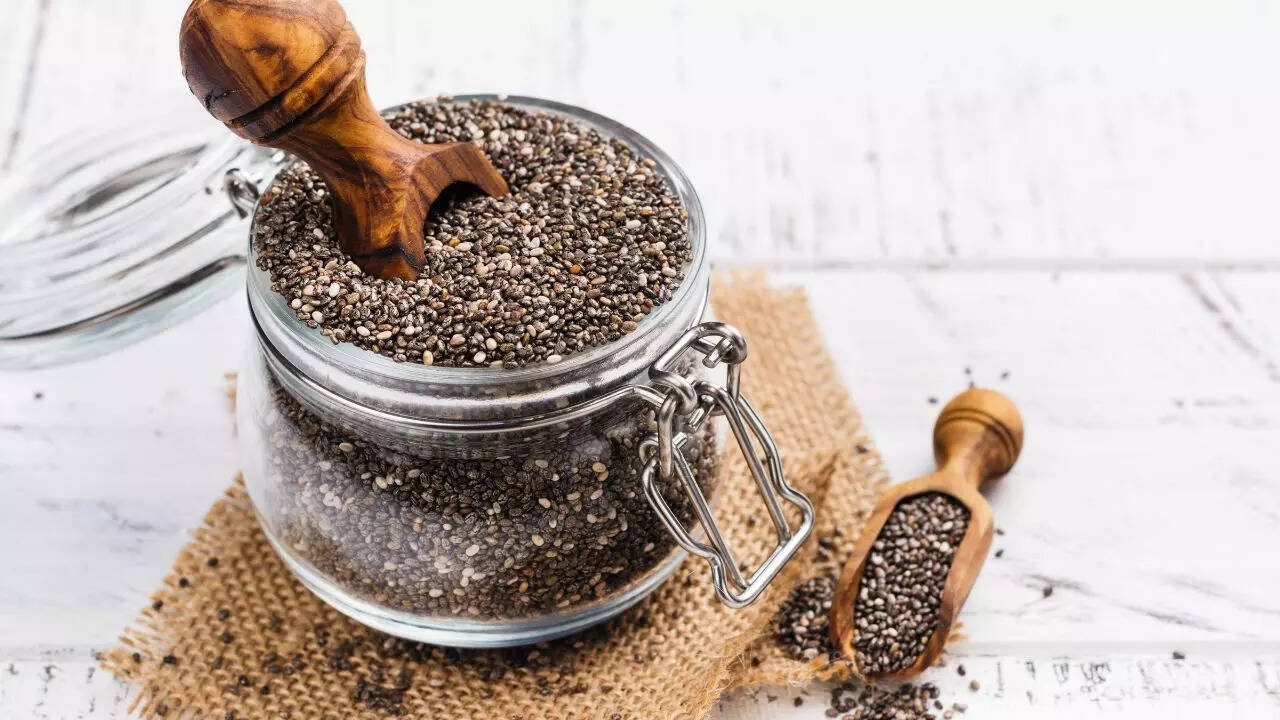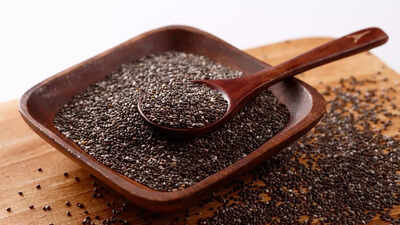
Chia seeds are tiny nutritional powerhouses, loaded with fiber, protein, healthy fats, and essential minerals like magnesium, phosphorus, and zinc. Rich in omega-3 and omega-6 fatty acids and antioxidants, they offer wide-ranging health benefits. Regular consumption may support heart function, regulate blood sugar, improve digestion, reduce inflammation, and assist in weight management. Emerging research suggests that these seeds may also aid hormonal balance and gut health. Incorporating chia seeds into daily meals can be a simple yet effective way to enhance overall wellness. Here, we explore seven health conditions where chia seeds can make a meaningful difference.
Chia seeds for wellness: 7 health conditions they may improve

Heart disease
Chia seeds contain nutrients that promote cardiovascular health, including omega-3 and omega-6 fatty acids, magnesium, phosphorus, and copper. These nutrients work together to support proper heart function and blood vessel health, potentially reducing the risk of heart disease, stroke, and blocked arteries. Chia seeds help manage cholesterol levels by lowering total cholesterol and low-density lipoprotein (LDL), known as “bad” cholesterol, while raising high-density lipoprotein (HDL), the “good” cholesterol that helps remove excess cholesterol from the bloodstream. Additionally, magnesium in chia seeds supports blood vessel relaxation, proper muscle contraction, and efficient heart pumping. Omega-3 fatty acids, particularly EPA and DHA, help reduce inflammation, which can otherwise contribute to artery damage and heart disease.
Type 2 diabetes
Type 2 diabetes occurs when the body struggles to use insulin effectively, causing high blood sugar levels. Chia seeds, with their high fiber content, may support blood sugar control by slowing glucose absorption, reducing post-meal spikes, and helping maintain satiety to prevent overeating. The seeds also enhance insulin sensitivity, allowing the body to respond more effectively to the hormone. Antioxidants in chia seeds can reduce oxidative stress and inflammation, both of which are linked to insulin resistance and the development of type 2 diabetes. Regular inclusion of chia seeds in meals may help improve overall blood sugar management and support long-term metabolic health. According to a study published in NIH, the high fiber content in chia seeds may aid in blood sugar regulation by slowing glucose absorption. This could potentially help manage blood sugar levels in individuals with type 2 diabetes.
Constipation
Constipation is defined by infrequent bowel movements, hard stools, or difficulty passing stool. Chia seeds are high in insoluble fiber, which adds bulk to stool and promotes regular bowel movements. This helps maintain healthy digestion and prevents discomfort associated with constipation. The combination of insoluble and soluble fibers in chia seeds also supports overall gut function by retaining water in the intestines, softening stool, and promoting smooth passage through the digestive tract. Regular consumption of chia seeds can help improve bowel regularity and reduce the risk of digestive complications over time.
Inflammatory arthritis
Inflammatory arthritis, including conditions such as rheumatoid arthritis and psoriatic arthritis, is characterised by chronic joint inflammation and pain. Chia seeds provide nutrients with anti-inflammatory effects, including alpha-linolenic acid (ALA), magnesium, and zinc. These compounds may help reduce joint inflammation, ease discomfort, and support overall joint health. Incorporating chia seeds into the diet may complement conventional treatments for arthritis, helping individuals manage pain and maintain mobility. Their antioxidant properties can also counteract oxidative stress, which contributes to inflammation and joint damage over time.
Gastrointestinal conditions
Chia seeds may benefit gastrointestinal health due to their high soluble fiber content. Soluble fiber feeds healthy gut bacteria, which ferment it to produce short-chain fatty acids that support the gut lining and overall digestive function. This fermentation process slows bowel emptying while softening stool, helping regulate bowel movements and prevent digestive disorders. Regular intake of chia seeds can encourage a balanced gut microbiome, reducing inflammation and promoting optimal gastrointestinal function. People with conditions linked to gut imbalances, such as irritable bowel syndrome or mild intestinal inflammation, may particularly benefit from the prebiotic effects of chia seeds.
Obesity and weight management
Chia seeds have a low glycemic index, meaning they do not cause rapid spikes in blood sugar, which can contribute to weight gain. Their high fiber and protein content promotes satiety, helping reduce appetite and prevent overeating. By supporting a feeling of fullness, chia seeds can assist in managing caloric intake and promoting gradual, sustainable weight loss. Additionally, the healthy fats in chia seeds support metabolism and energy balance. Incorporating chia seeds into meals or snacks may complement a balanced diet and lifestyle plan aimed at weight management and metabolic health.
Polycystic ovary syndrome (PCOS)
PCOS is a hormonal disorder that affects ovarian function and can cause irregular periods, cysts, and metabolic complications such as insulin resistance. While there is no cure, dietary strategies can help manage symptoms. Chia seeds may help by reducing chronic inflammation, which is common in PCOS, and by providing omega-3 and omega-6 fatty acids that support metabolic health. These nutrients can improve insulin sensitivity, help regulate blood sugar, and assist with weight management. Regular consumption of chia seeds may therefore help mitigate some of the metabolic and hormonal challenges associated with PCOS, supporting overall health and wellbeing.Chia seeds are a versatile, nutrient-rich food that can benefit a variety of health conditions. From supporting heart health and blood sugar control to improving digestion, managing inflammation, and assisting with weight management, these tiny seeds offer significant potential benefits. Including chia seeds in a balanced diet may help reduce the risk or severity of conditions such as heart disease, type 2 diabetes, constipation, arthritis, gastrointestinal issues, obesity, and PCOS. By making chia seeds a regular part of meals, individuals can support overall health, metabolic balance, and long-term wellness.Disclaimer: This article is for general informational purposes only and is not a substitute for professional medical advice, diagnosis, or treatment. Always seek the guidance of a qualified healthcare provider regarding any medical condition or lifestyle change.Also Read: How to choose the perfect pomegranate: 5 easy secrets you need to know








